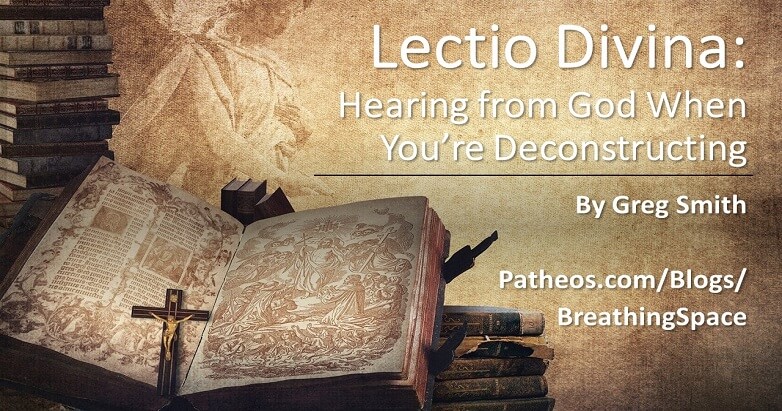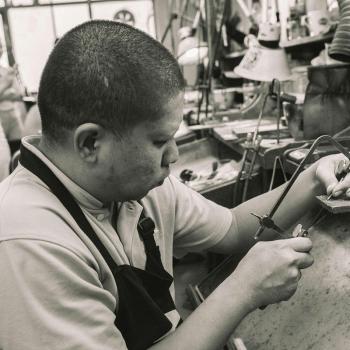During the deconstruction process, Christians often say it’s difficult to hear from God. All the ways that they used to feel intimate with God are now called into question. They often say that the Bible has gone stale for them and want to know how it can come alive again.

The Bible
If you were raised Evangelical, you were probably told that the Bible is the primary way that God speaks to people today. Many conservative churches teach that at one time God spoke through the prophets of old, but in this dispensation, the Bible is now the voice of God, inerrant and infallible. If you are deconstructing, then you have already discovered contradictions in the scriptures. Perhaps you’re calling into question the nature of biblical inspiration. But something within you still wants to experience God through reading the scriptures. What’s a deconstructing Christian to do?
Lectio Divina
Lectio Divina, or Divine Reading, comes to us from the sixth century, when Benedict of Nursia taught it to his monks as a method of hearing from God. Hearing from God is difficult to do if you have been deconstructing and studying relentlessly. Your brain is tired. While there is great value in biblical study, it can overload your thinking. In Acts 26:24, Festus tells Paul, “Too much study is driving you insane!” Benedict taught Lectio Divina not as a way of digging deeper intellectually, but as a way to simply listen to God. Through Lectio Divina, the Bible comes alive again, even if you have been questioning the Bible’s ultimate source.
Benedict’s method involves four steps: Lectio (reading), Meditatio (meditation), Oratio (prayer), and Contemplatio (contemplation). In this four-part series, I’ll explore each of these. Together we’ll find out how to hear from God through the Bible, even when you’re deconstructing.
Divine Reading
Choose a scripture passage with which you have not been wrestling theologically. This is important because the purpose of Lectio Divina is specifically not to dig into theology. Sit quietly with your Bible and read the passage to yourself. Reading out loud is a wonderful way to hear the Bible with your ears, because “faith comes by hearing, and hearing through the Word of God (Romans 10:17).” The following steps can help with that faith, even while you deconstruct:
- The first time you read the passage try not to interpret or understand anything. Just let the words wash over you. Read them slowly, savoring each word as a delicious morsel. Read the scripture for the sounds of the words. See if you can go beyond the individual words to the spirit behind them. When you come to the end of the passage, simply sit in silence for a moment, allowing it to sink in.
- Read the passage over again, slower this time. See if a word or phrase stands out to you from the reading. It’s important that you try not to intellectually choose an interesting verse for further study. This is not an exercise in exegesis. The phrase you choose should be short, preferably a word or two. When you have finished reading that passage of scripture, sit in silence with the word. Make friends with that word.
- Read the passage over again for a third time, even slower now. As you read, ask, “What is this word or phrase saying directly to me?” Don’t worry that you might be misinterpreting the original historical meaning of the scripture. If you want a scholarly understanding, then study—but this isn’t what Lectio is about. Instead, ask, “Why has this word stood out to me? What is the word saying about my life today? How does the word relate to what’s going on in my heart, mind, and life?” Sit in silence with these questions for as long as it takes for you to see the connection.
- Read the passage of scripture for a fourth time, still slower if possible. As you read, ask yourself what that word or phrase is asking you to do today. Lectio Divina is not so much interested in orthodoxy as orthopraxy. When religion gets caught up in a quest for orthodoxy, the goal of scripture reading is figuring out right doctrine. But orthopraxy focuses on right practice. Lectio is designed to change your relationship with the Bible. Instead of a static roadmap, the Bible becomes a GPS that recalculates every time you sit and listen.
The Bible for Deconstructors
As you deconstruct, it’s important to study the Bible critically. Healthy deconstructors pour over the scriptures to find new ways of interpretation, expanding their viewpoints beyond the dualistic conservative-vs-liberal understandings. Yet, in their studies, deconstructors often throw out the Bible with the bathwater and give up on trying to hear from God when they read scripture. Lectio Divina provides a way to do just that, without getting caught up in intellectualism.
The Bible Out of Context?
Opponents of Lectio Divina claim that the practice lifts words and phrases from scripture out of its historical and theological context. Do you know what? They’re right. But the purpose of Lectio isn’t to meet God in the context of the biblical authors. It’s to meet God in the context of your everyday life. Again, this isn’t Bible study. This is listening to God. With this approach to scripture, Bible reading becomes a way for God to speak to you, beyond intellectualism.
Lectio and Ink Blots
In Divine Reading, the scripture works like a Rorschach test, tapping into your subconscious where the Holy Spirit speaks in a still small voice. Finding the logos, or that sacred word or phrase, in a passage of scripture is like making sense out of ink blots. What stands out to you will be entirely different from what stands out to someone else. Today’s reading of one scripture will yield a different result than tomorrow’s reading of the same scripture. Try this in a group, and you will see how one passage evokes different things for different people. If you aren’t trying to do Bible study, then it doesn’t matter that you’re taking scripture out of context. Instead, the sacred word is giving you context for your life.
Head and Heart
Someone asked me recently if I was in favor of deconstruction. Of course, I am! Deconstruction is like a physical workout. It’s good for you but it doesn’t come without effort. The pain of deconstruction comes when all the intellectual questioning makes your spiritual life fall apart. During deconstruction, you learn a lot. But like Festus said, too much learning can drive you crazy. This is why many seminarians jokingly call seminary “cemetery.” Lectio Divina takes the head work out of reading the Bible and places the scripture in the realm of the heart. When you want to hear from God during deconstruction, the Bible is still great—but only if you read it with the heart as well as the head.
Next Time…
Benedict’s Lectio Divina involves a four-step process. Today we’ve looked at the first part, Lectio, or Reading. Benedict’s second step is Meditatio, or Meditation. Next time, join me for an incendiary title, “Christian Mantras: Hearing from God When You’re Deconstructing.”












